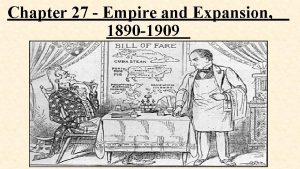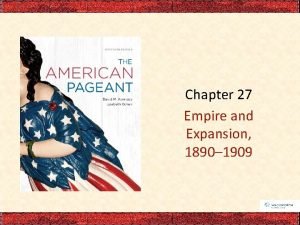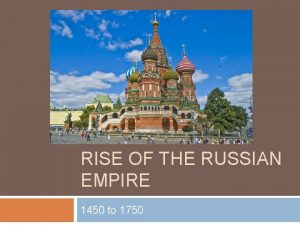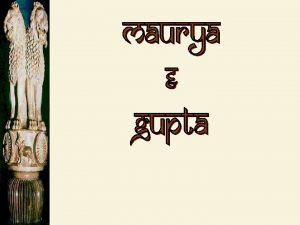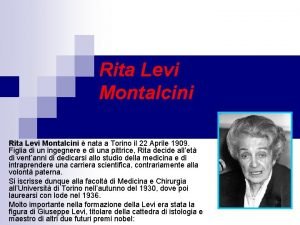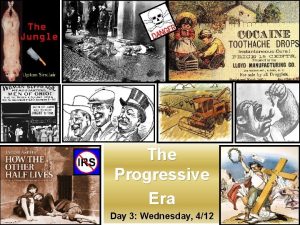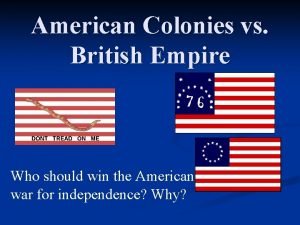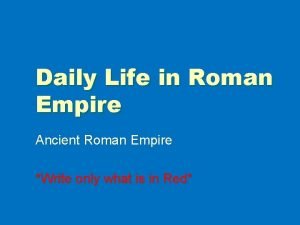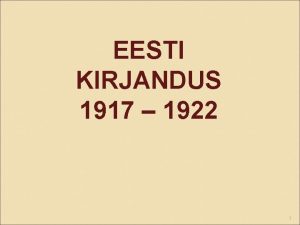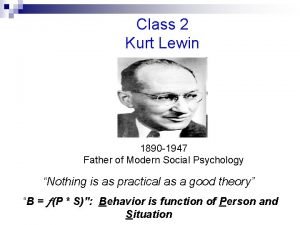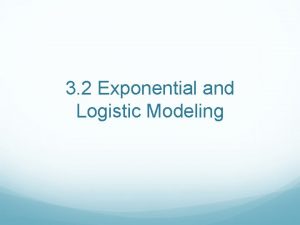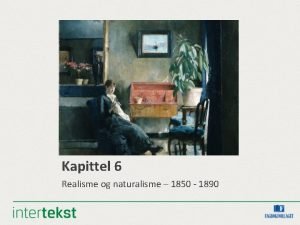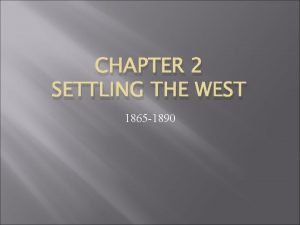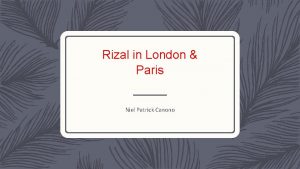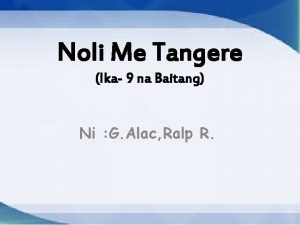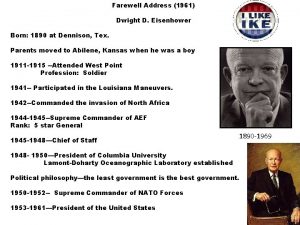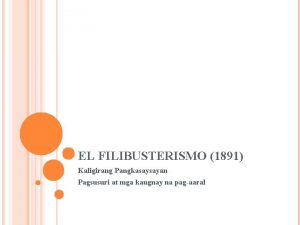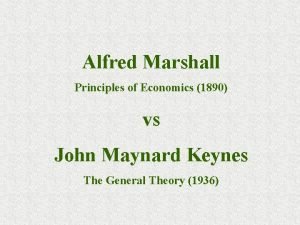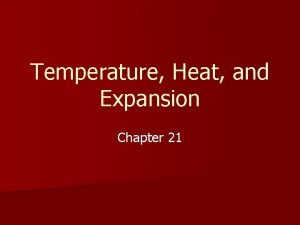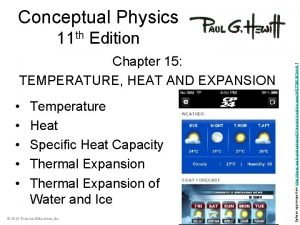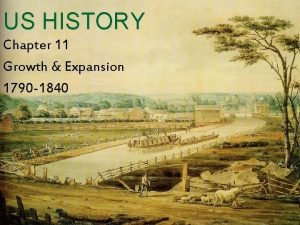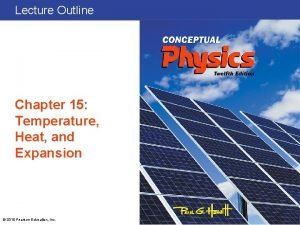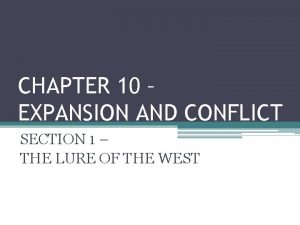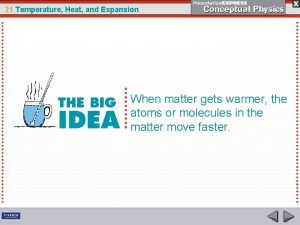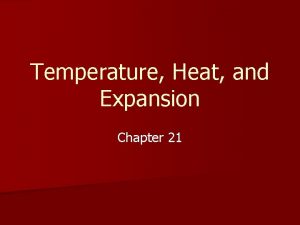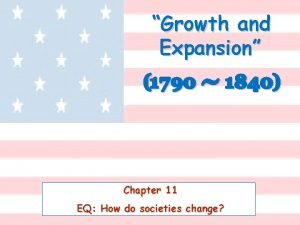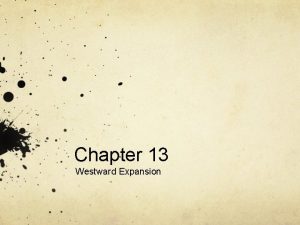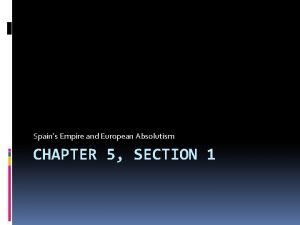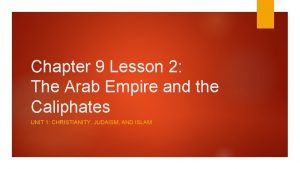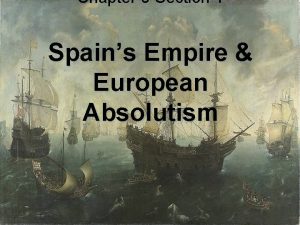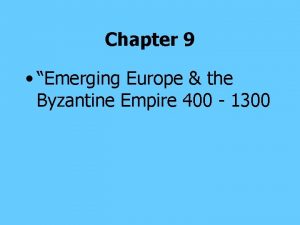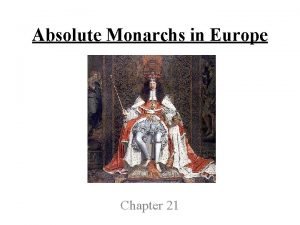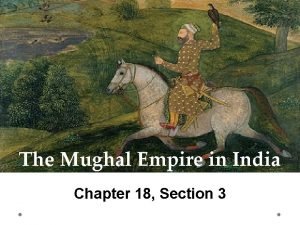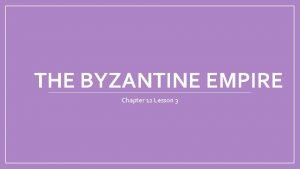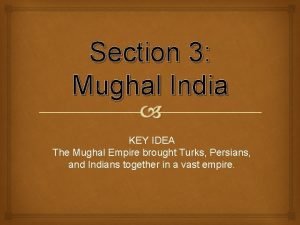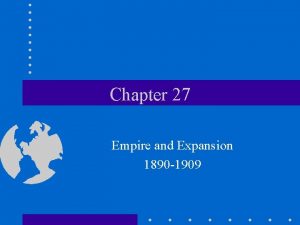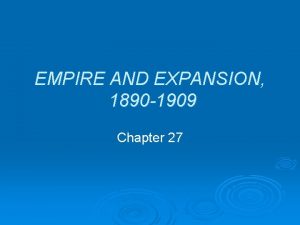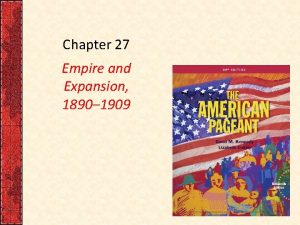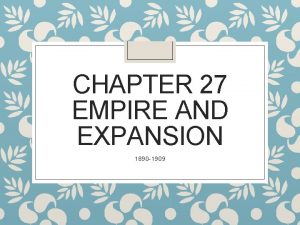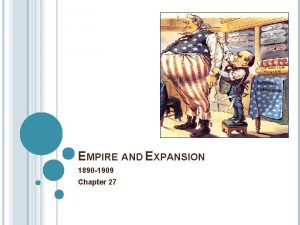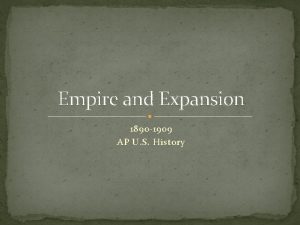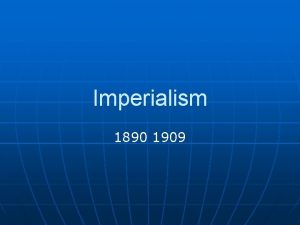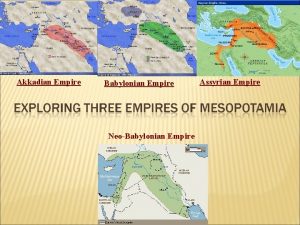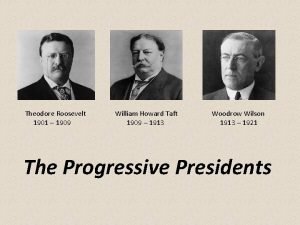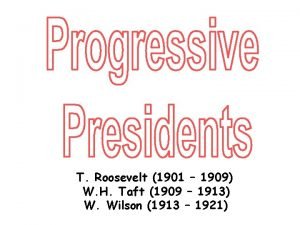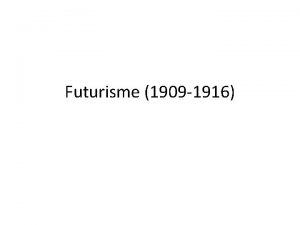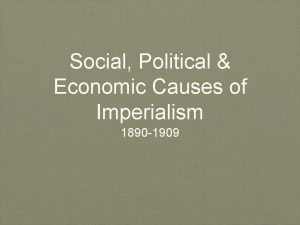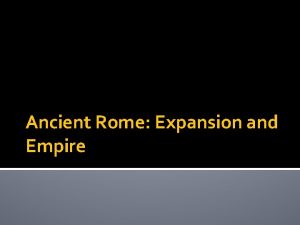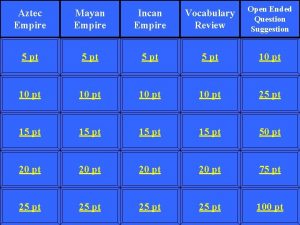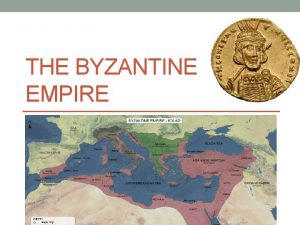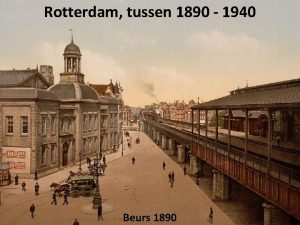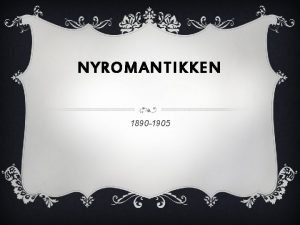Chapter 27 Empire and Expansion 1890 1909 I












































- Slides: 44

Chapter 27 Empire and Expansion, 1890– 1909

I. America Turns Outward • National ambition for overseas expansion – Expanded resources and markets – Big Sister policy • Latin America nations behind Uncle Sam’s leadership • Great Rapprochement – Multiple crises with Great Britain avoided – Two nations reconcile

p 609

p 610

II. Spurning the Hawaiian Pear • Hawaii was an early attraction for Americans – Location, religion, sugar • Mc. Kinley Tariff – Taxed Hawaiian sugar – Planters organized a successful revolt early 1893 – U. S. would not annex until 1898

Map 27 -1 p 611

p 612

III. Cubans Rise in Revolt • Cuba rose against their Spanish oppressor(1895) – The roots of the revolt were partly economic – Spanish general “Butcher” Weyler took charge • Maine to Cuba for a “friendly visit” (1898) – Maine mysteriously blew up in Havana harbor • Mc. Kinley sent his war message to Congress – Congress adopted the Teller Amendment • U. S. would fight for Cuba’s freedom

p 613

IV. Dewey’s May Day Victory at Manila (Spanish-American-Filipino War) • U. S. plunged into war (May, 1898) • Commodore Dewey attacked Spain’s Philippines – Assisted by Emilio Aguinaldo • Pacific war increased a desire for Hawaii – Hawaii received full territorial status in 1900 • Spain surrenders The Philippines (Aug. , 1898)

Map 27 -2 p 614

V. The Confused Invasion of Cuba (Spanish-American-Cuban War) • The Rough Riders – Regiments of volunteers • Organized principally by Theodore Roosevelt • Commanded by Colonel Leonard Wood • Spain on signed an armistice (August, 1898) – U. S. deaths: ~5, 000 died of disease, 400 by combat

p 615

p 616

Map 27 -3 p 616

VI. America’s Course (Curse? ) of Empire • Paris Treaty(1898) ends Spanish-American War – Cuba gains independence (from Spanish overlords) – U. S. gains Guam, Puerto Rico, Philippines • U. S. paid $20 million for Mania • The Anti-Imperialist League – Don’t annex Philippines – Don’t make Philippines a colony

p 617

p 618

p 619

p 619

VII. Perplexities in Puerto Rico and Cuba • The Insular Cases – Puerto Ricans/Filipinos) subject to American rule • But they did not enjoy all American rights • The anomalous Puerto Rico – The Foraker Act (1900) • Congress granted U. S. citizenship in 1917 • Cubans forced to accept Platt Amendment(1901) • U. S. intervention when U. S. saw necessary

VIII. New Horizons in Two Hemispheres • Spanish-American War – a “splendid little war” – Short (113 days) and successful • U. S. became a full-fledged Asian power

IX. “Little Brown Brothers” in the Philippines • Disappointed Filipinos hoped for independence – Emilio Aguinaldo fights back (1899 -1901) – United States was forced to deploy 126, 000 troops – 4, 234 Americans, ~600, 000 Filipinos died • William H. Taft became governor in 1901 – He called them his “little brown brothers” – “Benevolent assimilation” policy • Cost U. S. millions • Filipinos pined for liberty

p 622

X. Hinging the Open Door in China • Open Door note (1899) – Respect Chinese rights – Keep China an “open door’ to fair trade • Boxer Rebellion – Anti-foreigner uprising • Results of the Boxer Rebellion – Europeans/Americans win & control trade – Tens of thousands died – Chinese forced to pay $333 million reparations

p 623

p 624

p 625

p 625

p 626

XI. Imperialism or Bryanism in 1900? • Mc. Kinley renominated by Republicans in 1900 • William Jennings, choice of the Democrats • 1900 Election results – Mc. Kinley wins popular vote 7, 218, 491 to 6, 356, 734 – Electoral College 292 to 155 for Mc. Kinley • Victory for the Republicans – Won b/c of Prosperity & protectionism. (The 2 P’s)

XII. TR: Brandisher of the Big Stick • William Mc. Kinley murdered in September 1901 • Teddy Roosevelt becomes President (age 42) • Ardent champion of military and naval preparedness • He loved people and mingled with all ranks – Disregarded delicate checks and balances – Take any action not forbidden by Constitution

p 627

XIII. Building the Panama Canal • Hay-Pauncefote Treaty: between US and GB – Gave U. S, legal right to build canal • Congress decided on Panama route (June 1902) – The Columbian Senate rejected U. S. offer – Panama rebels, U. S. defends Panama and buys land • Panama Canal Construction begins in 1901 – Cost was ~$400 million, completed in 1914

p 628

XIV. TR’s Perversion of Monroe’s Doctrine • The Roosevelt Corollary to the Monroe Doctrine – “Preventive intervention” by the U. S. – No Europeans could push around Latin America • TR’s promote the “Bad Neighbor” policy – U. S. seen as the ‘Colossus of the North’ – Policy used to justify wholesale interventions

p 629

XV. Roosevelt on the World Stage • Russo – Japanese War (1904 -1906) – Japan attacks Port Arthur (1904) – Russia’s counter attacks fail (1905) – TR negotiates a peace (1906) • TR received the Nobel Peace Prize in 1906 – Russia & Japan both upset about treaty • Japan and America now became rivals in Asia


XVI. Japanese Laborers in California • Side effect of the Russo-Japanese War – Japanese immigrants poured into California – TR negotiated the “Gentlemen’s Agreement” • TR sends out “The Great White Fleet” (1907) • U. S. /Japan sign Root-Tarahira agreement (1908) – Both agree to respect the other’s Pacific possessions – And to uphold the ‘Open Door’ in China.

p 631

p 632

Map 27 -4 p 633

p 635
 Chapter 27 empire and expansion
Chapter 27 empire and expansion Chapter 27 empire and expansion
Chapter 27 empire and expansion Russian empire art and architecture 1450 to 1750
Russian empire art and architecture 1450 to 1750 Venn diagram of mauryan and gupta empires
Venn diagram of mauryan and gupta empires Nata a torino nel 1909
Nata a torino nel 1909 Alfred kamenski
Alfred kamenski How did the person named in this 1909 handbill
How did the person named in this 1909 handbill Frank parsons' theory
Frank parsons' theory American empire vs british empire
American empire vs british empire Ancient rome recreation
Ancient rome recreation Motives of old imperialism
Motives of old imperialism Kirjanik 1890-1952
Kirjanik 1890-1952 Riconoscimento degli oggetti
Riconoscimento degli oggetti Father of social psychology
Father of social psychology Penholder tutuşu
Penholder tutuşu The population of smallville in the year 1890 was 6250
The population of smallville in the year 1890 was 6250 Exponential functin
Exponential functin Forfattere i realismen
Forfattere i realismen 1890 computer
1890 computer Settling the west 1865-1890
Settling the west 1865-1890 Biscuit mold by rizal
Biscuit mold by rizal Larawan ng noli me tangere
Larawan ng noli me tangere Ayon kay keller ang pagsulat ay
Ayon kay keller ang pagsulat ay Born 1890
Born 1890 Kaugnayan ng noli at el fili
Kaugnayan ng noli at el fili Keynes marshall
Keynes marshall Specific heat of platinum
Specific heat of platinum Chapter 15 temperature heat and expansion
Chapter 15 temperature heat and expansion Chapter 11 growth and expansion
Chapter 11 growth and expansion Chapter 21 temperature, heat and expansion answer key
Chapter 21 temperature, heat and expansion answer key Chapter 10 expansion and conflict worksheet answers
Chapter 10 expansion and conflict worksheet answers Chapter 21: temperature, heat, and expansion answer key
Chapter 21: temperature, heat, and expansion answer key Chapter 12 territorial and economic expansion
Chapter 12 territorial and economic expansion Chapter 21 temperature heat and expansion
Chapter 21 temperature heat and expansion Chapter 21 temperature heat and expansion
Chapter 21 temperature heat and expansion Chapter 11 growth and expansion vocabulary
Chapter 11 growth and expansion vocabulary Chapter 13 westward expansion
Chapter 13 westward expansion Chapter 5 section 1 spain's empire and european absolutism
Chapter 5 section 1 spain's empire and european absolutism Chapter 9 lesson 2 the arab empire and the caliphates
Chapter 9 lesson 2 the arab empire and the caliphates Chapter 5 section 1 spain's empire and european absolutism
Chapter 5 section 1 spain's empire and european absolutism The byzantine empire and emerging europe
The byzantine empire and emerging europe Chapter 21 absolute monarchs in europe
Chapter 21 absolute monarchs in europe Chapter 18 section 3 the mughal empire in india
Chapter 18 section 3 the mughal empire in india Chapter 12 lesson 3 the byzantine empire
Chapter 12 lesson 3 the byzantine empire The mughal empire in india chapter 18 section 3
The mughal empire in india chapter 18 section 3
